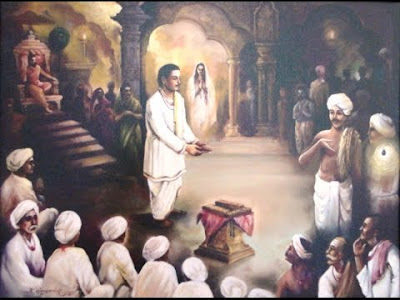Basavanna was an Indian 12th-century Statesman, philosopher, poet, Lingayat saint in the Shiva-focussed Bhakti movement, and social reformer during the reign of the Kalyani Chalukya/Kalachuri dynasty. Basavanna was active during the rule of both dynasties but reached his peak of influence during the rule of King Bijjala II in Karnataka, India.
Basavanna spread social awareness through his poetry, popularly known as Vachanaas. Basavanna rejected gender or social discrimination, superstitions and rituals but introduced Ishtalinga necklace, with an image of the Shiva Liṅga, to every person regardless of his or her birth, to be a constant reminder of one's bhakti (devotion) to Shiva.
Basavanna literary works include the Vachana Sahitya in Kannada Language. He is also known as Bhaktibhandari (literally, the treasurer of devotion)
Early life
Basavanna was born in 1105 CE in the town of Basavan bagewadi in the northern part of Karnataka to Madarasa and Madalambike, a Kannada Brahmin family devoted to Hindu deity Shiva.
Basava spent twelve years studying in a Hindu temple in the town of Kudalasangama, at Sangameshwara then a Shaivite school of learning, probably of the Lakulisha-Pashupata tradition.
Basavanna married Gangambike,a cousin from his mother's side. Her father was the provincial prime minister of Bijjala, the Kalachuri king. He began working as an accountant to the court of the king. When his maternal uncle died, the king invited him to be the chief minister. The king also married Basava's sister named Nagamma .
As chief minister of the kingdom, Basavanna used the state treasury to initiate social reforms and religious movement focussed on reviving Shaivism, recognizing and empowering ascetics who were called Jangamas. One of the innovative institutions he launched in the 12th century, was the Anubhava Mantapa, a public assembly and gathering, which attracted men and women across various walks of life, from distant lands to openly discuss spiritual, economic and social issues of life.He composed poetry in local language, and spread his message to the masses. His teachings and verses such as Káyakavé Kailása (Work is the path to Kailash (bliss, heaven), or Work is Worship) became popular.
VACHANA SAHITYA :
Several works are attributed to Basavanna, which are revered in the Lingayat community. These include various Vachana such as the Shat-sthala-vachana (discourses of the six stages of salvation), Kala-jnana-vachana (forecasts of the future), Mantra-gopya, Ghatachakra-vachana and Raja-yoga-vachana.
Basavanna Philosophy
Basavanna grew up in a family with a tradition of Shaivism.As a leader, he developed and inspired a new devotional movement named Virashaivas, or "ardent, heroic worshippers of Shiva". This movement shared its roots in the ongoing Tamil Bhakti movement and many movements.
Basavanna championed devotional worship that rejected temple worship and rituals led by Brahmins and replaced it with personalized direct worship of Shiva through practices such as individually worn icons and symbols like a small linga. This approach brought Shiva's presence to everyone and at all times, without gender, class or caste discrimination.
Basava's poem, such as Basavanna 703, speak of strong sense of gender equality and community bond, willing to wage war for the right cause, yet being a fellow "devotees' bride" at the time of his or her need.
ಉಳ್ಳವರು ಶಿವಾಲಯವ ಮಾಡುವರು !
ನಾನೇನ ಮಾಡುವೆ ? ಬಡವನಯ್ಯ!
ಎನ್ನ ಕಾಲೇ ಕಂಬ, ದೇಹವೇ ದೇಗುಲ,
ಶಿರವೇ ಹೊನ್ನ ಕಳಶವಯ್ಯ!
ಕೂಡಲಸಂಗಮದೇವ ಕೇಳಯ್ಯ,
ಸ್ಥಾವರಕ್ಕಳಿವುಂಟು, ಜಂಗಮಕ್ಕಳಿವಿಲ್ಲ!
ನಾನೇನ ಮಾಡುವೆ ? ಬಡವನಯ್ಯ!
ಎನ್ನ ಕಾಲೇ ಕಂಬ, ದೇಹವೇ ದೇಗುಲ,
ಶಿರವೇ ಹೊನ್ನ ಕಳಶವಯ್ಯ!
ಕೂಡಲಸಂಗಮದೇವ ಕೇಳಯ್ಯ,
ಸ್ಥಾವರಕ್ಕಳಿವುಂಟು, ಜಂಗಮಕ್ಕಳಿವಿಲ್ಲ!
Influence and Following
The Lingayats, also known as Virasaivas or Veerasaivas, traditionally believe that Basava was the founder of their tradition.However, modern scholarship relying on historical evidence such as the Kalachuri inscriptions state that Basava was the 12th-century poet-philosopher who revived and energized an already existing tradition.The community he helped form is also known as the Sharanas.
The community is largely concentrated in Karnataka, but has migrated into other states of India as well as overseas. Towards the end of the 20th century, Michael estimates, one-sixth of the population of the state of Karnataka, or about 10 million people, were Lingayat Hindus, or of the tradition championed by Basava.
 |
| Kudalasangama temple |
HIS DEATH :
Due to some communal and social issues basavanna had to live Kalyana where the king ordered him to leave the kingdom.
As seeing these riots Basavanna said by Pronouncing "Saku madi thande Lokadatavaneenu"(oh god,please end my role in the world). He sat for meditation rejecting food and water at birth place of confluence of Krishna and Malaprabha rivers.He never got up again and he became Lingyaikya.
WHAT IF BASAVANNA'S IDEOLOGIES WERE FOLLOWED MEANS :
If Bijjala had follwed with Basavanna in his brave efforts to reform the society,caste system would have been totally eradicated in Karnataka. and Karnataka would have been a model state in the whole country without any castes.
Realizing the importance of 'Kalyana Kranti',statue of Basavanna has been established in front of Parliament in New Delhi.
 |
| basavanna statue at london |
source:wiki



Comments
Post a Comment